#korean language vocab
Explore tagged Tumblr posts
Text
It's funny learning both japanese and chinese because in chinese when chinese learners complain about difficult words they are those that have simple strokes, about 3 or less pinyin pronunciations but have 58 different meanings and need specific usages where as in japanese, the difficult kanjis have 40 strokes like they've clawed all the way to earth from hell and have 80 different pronunciation but the meaning is pretty much the same across the words. So when I see chinese learners complain about a difficult word it's "guys, I think we should've left this word to die in classical chinese" but when japanese learners complain about a difficult word my response is either "that's just 8 radicals on top of each other. that's not hard" or "who angered a kami of kunyomi dominion, my god."
#studyblr#langblr#japanese language#chinese language#chinese langblr#japanese studyblr#chinese studyblr#don't mind the korean learners they're crying in the corner#because there's no way to differentiate hanja based advanced words that sound the same#you might think well it can't be bad but they're actively dying from the mountain of vocabs they're supposed to know#because “you can read all of them so you should know all of them” jfc
297 notes
·
View notes
Text
Korean Vocab _ Body Parts 신체 부위






머리: head 얼굴: face 눈: eyes 눈썹: eyebrows 코: nose 입: mouth 귀: ears 목: neck 어깨: shoulders 팔: arms 손: hands 손가락: finger 가슴: chest/breast 배: stomach/abdomen 허리: waist 등: back 다리: legs 무릎: knee 종아리: calves 발목: ankle 발: foot 발가락: toes
🤸♀️As always, here's a link to our instagram post!
*icon credits: Icon made by freepik from www.flaticon.com
#learn korean#study korean#한국어#korean vocab#한국어 공부#한국어 배우기#hangul#language#Vocabulary#vocab#langblr#language study
68 notes
·
View notes
Text
Korean Emotions (part 1)
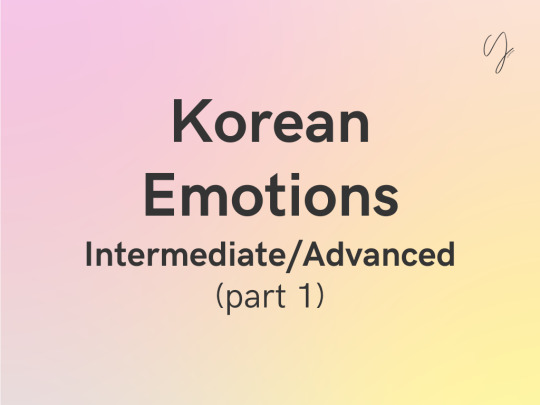
가뜬하다 (adj.) : refreshed; light-hearted 몸이나 마음이 가볍고 상쾌하다. Body or mind being light and refreshed. 예.) 가:너 오늘 기분이 굉장히 좋아 보인다? 나:과제를 다 끝냈더니 마음이 가뜬한 게 날아갈 것 같아.
가련하다 (adj.) : pitiful; poor; pathetic 마음이 아플 정도��� 불쌍하다. Sadly sick or troubled. 예.) 직장에서 해고를 당하고 집에서 놀고 있는 형이 매우 가련하다.
가소롭다 (adj.) : ridiculous; absurd 비웃고 무시할 만하다. Deserving to be belittled and ignored. 예.) 형은 내 말을 형편없고 가소롭다는 듯이 들은 척도 안 했다.
가엾다 (adj.) : feeling pity 마음이 아플 정도로 불쌍하고 딱하다. Feeling heartfelt pity or sympathy for someone. 예.) 나는 자식들을 먹여 살리느라 평생을 고생하신 어머니가 가엾게 느껴졌다.
가증스럽다 (adj.) : despicable; detestable 다른 사람의 말이나 행동이 화가 날 정도로 몹시 밉다. Behavior or a remark being mean or hypocritical enough to upset others. 예.) 승규는 남들 앞에서만 착한 척하는 지수의 행동이 가증스러웠다.
가책 (n.) : admonishment; rebuke 자기나 남의 잘못을 꾸짖음. The act of scolding oneself or others for doing something wrong. 예.) 나는 친구를 속이고 한동안 심한 죄책감과 가책에 시달렸다.
갈등하다 (v.) : be ambivalent 마음속에서 어떻게 할지 결정을 못 한 채 괴로워하다. To experience agony and inner struggle over what to decide. 예.) 나는 시험 준비를 할까 좋아하는 드라마를 볼까 한참을 갈등했다.
감개 (n.) : deep emotion 지난 일이 생각나서 마음속에서 솟아오르는 감동이나 느낌. One's state of feeling deeply moved and getting emotional from one's memory of past events. 예.) 작가는 몇 년 동안 고생하면서 쓴 소설이 출판된 것을 보고 깊은 감개에 젖었다.
감개무량하다 (adj.) : touched deeply; emotional 지난 일이 생각나서 마음속에서 느끼는 감동이 매우 크다. Feeling deeply moved and getting emotional from one's memory of past events. 예.) 상을 받은 여배우는 감개무량한 표정으로 소감을 이야기했다.
감격하다 (v.) : be touched 마음에 깊이 느끼어 매우 감동하다. To be deeply moved and touched by someone or something. 예.) 대회에서 일 등을 한 선수는 감격한 표정으로 소감을 말하였다.
감동하다 (v.) : be moved; be touched 강하게 느껴 마음이 움직이다. To be touched by something very deeply. 예.) 나는 어려운 환경에서도 꿈을 잃지 않고 살아가는 청년의 이야기를 듣고 무척 감동했다.
감명 (n.) : impression 잊을 수 없는 큰 감동을 느낌. 또는 그런 감동. A state of being deeply touched, or such a feeling. 예.) 지수는 가족의 사랑을 그린 영화를 보고 감명을 받아 눈물을 흘렸다.
감미롭다 (adj.) : mellow; sweet 달콤한 느낌이 있다. A story, voice, song, etc., sounding sweet. 예.) 김 감독은 사랑에 빠진 남녀의 행복하고 감미로운 사랑 이야기를 영화로 만들었다.
감복하다 (v.) : be impressed; be moved 진심으로 크게 감동하다. To be impressed deeply and sincerely. 예.) 공연이 끝난 후 관객들은 배우들의 훌륭한 연기에 감복해 박수를 쳤다.
감탄하다 (v.) : admire; wonder 마음속 깊이 크게 느끼다. To feel strongly and deeply about something. 예.) 관객들은 서커스 단원의 공중 묘기에 감탄하여 박수를 쳤다.
감회 (n.) : reminiscence 마음속에 일어나는 지난 일에 대한 생각이나 느낌. Thoughts or feelings on the past. 예.) 아버지는 돌아가신 할머니의 사진을 보며 감회에 젖으셨다.
개탄하다 (v.) : deplore; lament 분하거나 안타깝게 여겨 탄식하다. To sigh at something out of anger or regret. 예.) 나는 경솔한 말 한마디로 사랑하는 여자를 떠나보낸 뒤 자신이 어리석었다고 개탄했다.
거부감 (n.) : sense of refusal 어떤 것을 받아들이고 싶지 않은 느낌. The feeling of not wanting to accept something. 예.) 이 책은 고전을 청소년들의 눈높이에 알맞게 개작하여 그들이 거부감을 갖지 않고 쉽게 읽을 수 있다.
걱정하다 (v.) : worry; be worried; be concerned 좋지 않은 일이 있을까 봐 두려워하고 불안해하다. To feel fearful and anxious that something bad might happen. 예.) 그는 다가올 시험에 대해 항상 걱정했다.
겁나다 (v.) : be afraid; be scared 무서워하거나 두려워하는 마음이 들다. To feel afraid or scared of something. 예.) 나는 교통사고를 당한 이후 차 타는 것이 겁난다.
격노하다 (v.) : be furious; be enraged 몹시 화를 내다. To be extremely angry. 예.) 강제로 해고된 직원들이 회사에 격노하여 복직을 요구하는 시위를 벌였다.
격분하다 (v.) : be furious; be enraged 몹시 화를 내다. To be extremely angry. 예.) 사기 피해자들이 격분하여 사기꾼의 멱살을 잡고 분통을 터뜨렸다.
격정 (n.) : passion 강렬하고 갑자기 생기는 참기 어려운 감정. A powerful, sudden burst of uncontrollable emotion. 예.) 나는 알 수 없는 격정으로 가슴이 꽉 막히는 것 같았다.
겸연쩍다 (adj.) : embarrassed; abashed; sheepish; awkward 쑥스럽거나 미안하여 ��색하다. Awkward due to being shy or sorry. 예.) 나는 짝사랑했던 그를 마주 대하기가 겸연쩍어 자리를 옮겼다.
sources:
KOR-EN Basic Korean Dictionary through Naver Dictionary. National Institute of Korean Language. Accessed 14 July 2024. <https://en.dict.naver.com/#/main>.
Park, In-Jo., & Min, Kyung-Hwan (2005). Making a List of Korean Emotion Terms and Exploring Dimensions Underlying Them. Korean Journal of Social and Personality Psychology, 19(1), 109-129.
#한국어#한국어 공부#공부계#한국어 공부하기#한국어 배우기#korean#learning korean#study korean#studyblr#new vocab#korean learning#learning#learn english#learnlanguages#learnsomethingneweveryday#english#english language#language stuff#korean vocabulary#korean language#korean english
54 notes
·
View notes
Text
한국 전래동화에 나오는 어회와 문법 ! - Vocabulary and grammar in traditional Korean fairytales !
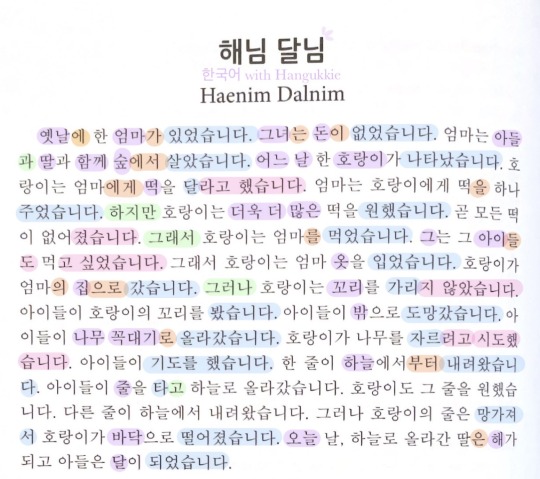
English Translation:
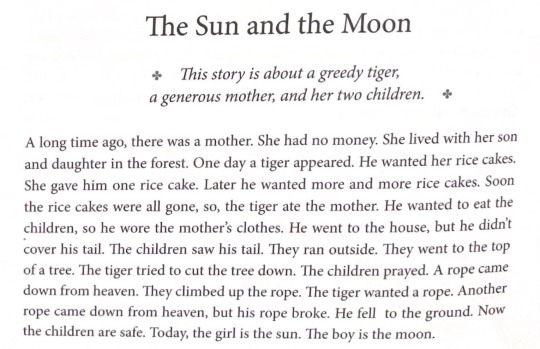
———————————————————
Vocabulary:
옛날 - Olden days
옛날에 - Once upon a time
어머니/엄마 - Mum
그녀 - She/Her
돈 - Money
아들 - Son
딸 - Daughter
함께 - Together
숲 - Forest
어느 - Which
날 - Day
호랑이 - Tiger
떡 - Rice cake
더욱 더 - More and more
많이/많은 - Many/A lot
그 - He/Him
아이 - Kid/Child
아이들 - Kids/Children
옷 - Clothes
집 - House
꼬리 - Tail
밖 - Outside
나무 - Tree
꼭대기 - The top
하늘 - Sky
줄 - Rope
바닥 - Floor
오늘 - Today
해 - Sun
달 - Moon
Grammar - Verbs:
있다 - To exist
없다 - To not exist
살다 - To live
나타나다 - To appear
달다 - To ask/To request (In this context)
주다 - To give
원하다 - To want/To wish/To desire
먹다 - To eat
가다 - To go
가리다 - To cover
보다 - To see
도망가다 - To run away
올라가다 - To go up
자르다 - To cut
기도를 하다 - To pray
내리다 - To get off
떨어지다 - To fall
된다 - To become
Grammar - Sentence Forms:
라고 하다 - For indirect quotations
지다 - To become
도 - Too/Also/As well as
고 싶다 - To want
지 않다 - Is not
려고 - To intend to
시도하다 - To attempt to
Grammar - Connectives:
과 - And/With (With 받침)
하지만 - But
그래서 - So
그러나 - But/However
하고 (고) - And/With
Grammar - Markers/Particles:
에 - To/At (Location and time marker)
가 - Subject particle
는 - Topic particle
이 - Subject particle (With 받침)
에서 - At/In/On/From (Location marker)
에게 - To/For
을 - Object particle (With 받침)
를 - Object particle
들 - Plural marker
의 - Possessive marker
으로 - By/As/For/To/Towards/With (Directional marker)
로 - By/As/For/To/With (Directional marker - with 받침)
부터 - From/Since (Location and time marker)
은 - Topic particle (With 받침)
#korean language#korean langblr#korean#langblr#korean study blog#korean studyblr#study blog#studyblr#korea#korean vocab#korean vocabulary#korean vocab list#Korean stories#Korean fairytales#Korean folktales#korean folklore#한국#한국어#한국어 공부#한국어 읽기#한국어 어휘#한국어 단어#한국어 문법#공부#읽기#어휘#단어#문법#한국 전래동화#전래동화
458 notes
·
View notes
Text
Semester in SK: Korean Curse Words
안녕하세요 여러분! I’m sharing yet another Instagram post with you all--this one is about a bunch of Korean curse words! Very silly, I know, but curse words are a big part of any language and can be fun to learn about! Of course, be careful when using these and please do not use them often--I’m just sharing them for fun and so you can recognize them if you hear them :) I hope you enjoy! 화이팅!

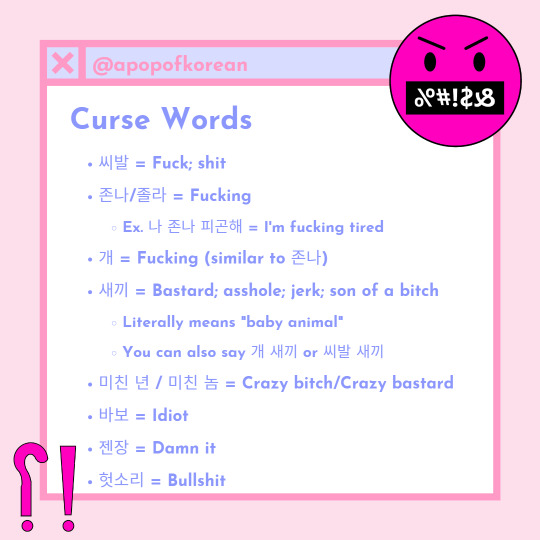
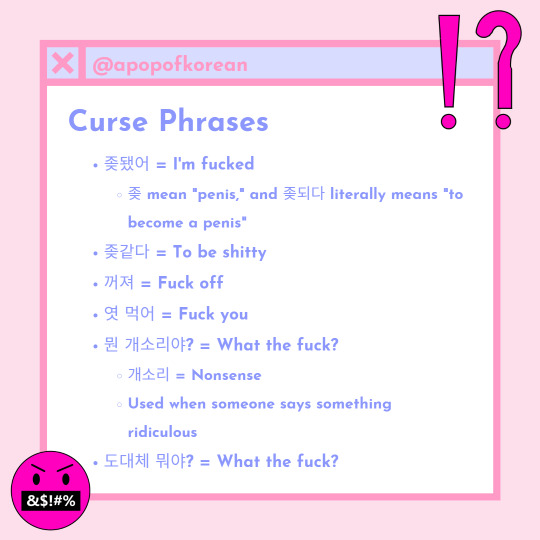

My masterlist
Join my Discord chat here to practice Korean with others!
Follow me on Instagram here for more Korean content!
Get Drops Premium using my affiliate link to expand your Korean vocab!
Check out my Ko-Fi to support this blog and my studies! Thank you for your generosity!
#korean#korean language#korean vocabulary#korean vocab#study abroad#learn korean#learning korean#study korean#studying korean#korean culture#유학#유학생활#한국#한국 문화#어휘#한국어#한국어 공부하기#한국어 배우기#langblr#korean langblr
469 notes
·
View notes
Text
한자어 - 적/的
적(的). affix. '과녁'이나 '목표', '분명하다'라는 뜻을 가진 글자이다. (a letter with the meaning of 'target' or 'aim, goal', 'clear, distinct'.)
the suffix -적 is used to turn nouns into adjectives or adverbs, for example:
대화적 - oral, conversational, dialogic
세계적 - global
일반적 - common, regular
정신적 - mental(ly)
남성적 - masculine
the suffix 적 is often used in combination with the copula -이다 to form an adnominal -인, or with the instrumentative particle -으로 to form an adverb of manner, for example: 정신적으로 힘들다 (to be hard mentally), 남성적인 여자 (masculine woman)
#한국어#korean#korean studyblr#korean langblr#langblr#langvillage#한국어 공부#한국어 배우기#한국어 공부하기#한자#한자어#漢字#study korean#한국말#korean vocab#korean language#learning languages#foreign languages#language learning#languages
28 notes
·
View notes
Text
Different words meaning 'to use'.
이용하다 - to utilise something for the beneficial facility or function it offers (can also refer to taking advantage/exploiting in a negative way)
쓰레기통을 이용하세요 = please use the trash can
이용자 = a user/visitor of a facility or space
인터넷 이용자 = a user of the internet
도서관 이용자 = a library goer
사용하다 - to use, operate or employ a tool of some kind
컴퓨터를 사용해도 되나요? = May I use the computer?
사용설명서 = instruction manual (lit. usage + explanation + document)
사용자 = consumer/utiliser of something
스페인어 사용자 - user(speaker) of Spanish
유용하다 - to possess uses/functions, able to be utilised positively
병을 여는 데 아주 유용해요 = it's useful/great for opening bottles
유용한 표현을 배우야 해 = you must learn useful/useable phrases
쓰다 - to use or employ something or wear (in terms of some accessories) (also means 'to write' and 'to be bitter'.)
돈을 썼어 = I spent my money
안경을 쓰는 사람 = a person who wears glasses
이것은 어디에 쓰는 겁니까? = where/what is this used for?
연필을 쓰세요 - please use a pencil (whereas 연필로 쓰세요 would be please write in pencil
tldr: 쓰다 is more simple and common in speech but is essentially the same as 사용하다. 이용하다 has a different nuance of referring to making use of a facility offered by an object or space (e.g. using the bathroom, the internet, public transport) rather than 쓰다/사용하다 being the personal, often physical, manipulation of a thing (e.g. using toilet paper, using photoshop, using a pencil). 유용하다 is not about the actual use of something, more a remark on something's ability to be used/useful. The recurring ~용 character of these words comes from the Chinese/Hanja 用 which refers to use, function, utilisation, consumption.
#korean#korean language#korean langblr#langblr#studyblr#korean studyblr#korean vocab#korean grammar#korean verbs
147 notes
·
View notes
Text

🌸🌼🌸 30-Day Journey to Korean Language Mastery! 🌸🌼🌸
Hey there language lovers! Are you ready for an exciting adventure in learning Korean at a more intermediate level? 🇰🇷✨ In this 30-day study schedule, we'll dive into some juicy grammar topics that'll take your Korean skills to the next level. Ready to embark on this language adventure? Let's rock this 30-day challenge together! Happy studying and remember, every step counts on the road to Korean language mastery! 화이팅! 💪✨
Week 1: Verb Modification and Advanced Sentence Structures Day 1: Time to dust off those honorifics and level up your respect game! Show some love to those verbs with various honorific verb endings. Day 2-3: Let's express our wishes and assumptions with "았/었으면 좋겠다" (I wish I had) and "-(으)ㄹ 텐데" (I suppose, I think). Wishful thinking, here we come! 🌠 Day 4-5: No more doubts about "have to" or "can do"! Master "-아/어/여야 하다" (have to, must) and "-아/어/여도 되다" (can, may). Day 6-7: Weave your magic into sentences with various verb modifications and advanced structures using the things you've studied the past few days.
Week 2: Subjunctive and Concessive Expressions Day 8-9: Curiosity piqued? Delve into "-아/어/여 보다" (try to do) and "-아/어/여지다" (become something). Adventure awaits! 🚀 Day 10-11: Unveil the power of "even if" with "-더라도" and the allure of "either" with "-든지". Day 12-13: Embrace "no matter how much someone says" with "아무리~-(으)라고 해도" and the certainty of "regardless of" with "-든간에". Day 14: Take a deep breath and look back on the amazing grammar points we've conquered so far! You're soaring to new heights! 🦅
Week 3: Advanced Particles and Connectives Day 15-16: Adventure calls! Set out on "-을 테니까" (since I will) and navigate "-느라고" (because of, due to). Day 17-18: Embrace the twists and turns of "-를 지경이다" (to the extent of) and "-는바람에" (because of, on account of). The path may be challenging, but you're up for it! Day 19-20: "Even if it's tough, let's do it!" Dive into "-아/어/여서라도" and "might have to do" with "-아/어/여야 할지도 모르다". Day 21: Let's take a moment to bask in the glory of the grammar points we've mastered in Week 1 to Week 3. Proud language learners unite! 🌟
Week 4: Expressing Intention and Assumptions Day 22-23: Master the art of expressing intentions with "기로 하다" (decide to do) and "으려던 참이다" (was about to do). Your plans are set in motion! Day 24-25: Delve into assumptions with "ㄴ/는다고 하다" (heard that) and "ㄹ/을 것 같다" (seems like). The mystery unfolds! 🔍 Day 26-27: Let's get speculative with "것 같으면서" (while feeling like) and "(으)니까" (since, because). The intrigue continues! 🕵️♂️ Day 28: Embrace your linguistic prowess as you navigate the subtleties of intention and assumptions. Let's recap the past few days!
Week 5: Advanced Particles and Expressions Day 29-30: Explore the nuances of "만에 하다" (to do after a long time) and "아니면서도" (although, even though). Time to fine-tune your expressions! Day 31: Reflect on your incredible progress and pat yourself on the back for conquering advanced grammar structures. You've come so far, and there's no stopping you now! 🎉
#Learn#Learning#Language Learning#korean#studyblr#koreanblr#langblr#study#vocabulary#vocab#words#studying#Vocabulary#Vocab#Words#Practice#study challenge#30 day challenge#language
235 notes
·
View notes
Text
Korean Body Vocab

Head Vocab
머리: head 머리카락: hair 귀: ear 얼굴: face 눈: eye 눈썹: eyebrow 코: nose 입: mouth 입술: lips 목: neck
머리가 아파요: My head hurts. 귀가 큰 고양이는 말썽꾸러에요: A cat with big ears is a troublemaker. 그는 파란색 눈을 있다: They have blue eyes.

Torso Vocab
가슴: chest (everyday word) 유방: chest (more medical) 갈비뼈: Rib 등: back 몸통: torso 배: stomach 옆구리: side 허리: waist/lower back 골반: pelvis 몸: body 신체: body (more formal, Sino-Korean (身體) 몸 which is native) 뒤: back/behind 앞: front
강아지는 등에 누워 있어요: The puppy is lying on their back. 효과적인 가슴 운동 루틴을 알려드릴게요: I’ll tell you an effective chest exercise routine.

Arm Vocab
어깨: shoulder 팔: arm 겨드랑이: armpit 팔꿈치: elbow 손: hand 손목: wrist (lit: hand neck) 손바닥: palm 손가락: finger 손톱: fingernail 엄지: thumb
우리 여자친구와 손을 잡고 싶어: I want to hold my girlfriend’s hand. 어깨넓이 몇이길래?: What’s your shoulder width?

Leg Vocab
엉덩이: butt 다리: leg 허벅지: thigh 무릎: knee 정강이: shin 종아리: calf 발목: ankle (lit: foot neck) 발: foot 발가락: toe 발톱: toenail 발바닥: sole (of the foot)
그는 갑자기 다리에 쥐가 났어요: He suddenly got a leg cramp. 발가락 부딪혔을때 아팠에요: It hurt when I hit my toe.
#korean#korean langblr#korean studyblr#vocab#studyblr#studyblog#langblr#language learning#korean expressions#mine
32 notes
·
View notes
Text
Vocabulary 직업
직업 - occupations
가수 - singer
간호사 - nurse
경찰 - police officer
공무원 - government employee
과학자 - scientist
교수 - professor
군인 - military personnel
기술자 - technician
기자 - reporter, newspaperman
농부 - farmer
님 - sir, ma’am (honorific form)
배우 - actor, actress
변호사 - lawyer
비서 - secretary
승무원 - flight attendant, crew
우체부 - mail carrier, postman
은행원 - bank employee
의사 - doctor
주부 - housewife
직업 - job, occupation
화가 - artist, painter
#korean#korean vocabulary#vocabulary#korean vocab#south korea#south korean#korea#language#language learning#korean language#korean langblr#langblr#study#korean studyblr#studyblr#learning#learn#studying#tesol#tesl#tefl#korean culture#teaching
18 notes
·
View notes
Text
Word Of The Day - DOG
pes (m)
(Czech)
.
chien (m)
(French)

hond (m)
(Dutch)
.
perro (m)
(Spanish)
.
개
(Korean)

ʻīlio
(Hawaiian)
.
cane (m)
(Italian)

#word of the day#langblr#czech#french#dutch#spanish#korean#hawaiian#italian#czech vocabulary#french vocabulary#dutch vocabulary#spanish vocabulary#korean vocabulary#hawaiian vocabulary#italian vocabulary#vocab#vocab list#vocabulary#vocabulary list#czech langblr#french langblr#dutch langblr#spanish langblr#multilingual#language#polyglot#studyblr#dutch language#languages
14 notes
·
View notes
Text
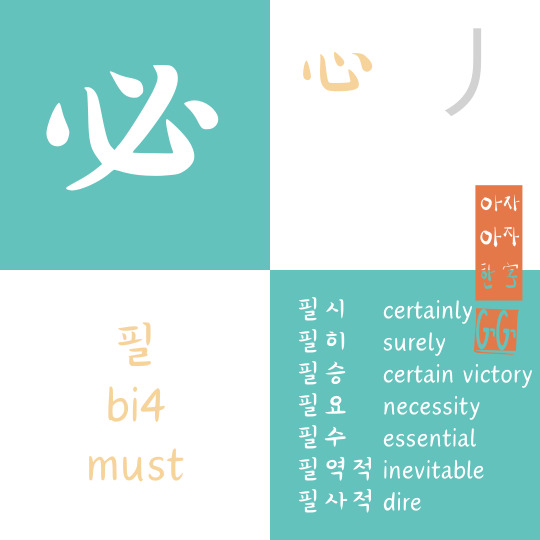
必 bi4 필
if you'd like to support me, check out my ko-fi!
character story:
It is necessary to follow your 丿일 one and only 心 심 heart to live a happy life.
Study vocab here!
Vocab:
필시 Certainly
필히 Surely
필승 Certain victory
\필요* Necessity
필요하다 to need (I need, we need, etc)
필요있다 to be necessary
필수** Being essential
필수과목 required course
필수조건 essential condition
필수품. Necessities
필연적. Inevitable
필사적 Desperate/dire
#5lvl#family: heart#필#bi4#alt:#korea#korean#korean language#korean learning#hanja#korean study#study korean#korean vocabulary#korean langblr#hanja vocab#hanja vocabulary#korean vocab#langblr#language#chinese characters#studyblr#original#ajaajahanja
65 notes
·
View notes
Text
쫓다 vs 좇다-
Sometimes even Koreans make mistakes of using 쫓다 in places of 좇다, but there are differences! Read more to find out the difference between these two similar words :)




Basically,
🔸️쫓다 - To rush after something in order to catch or meet an object - 쫓다 is chasing something physical - Used with words like 술래(tagger), 추격전(chase), 사냥꾼(hunter)
🔸️좇다 - To pursue goals, ideals, happiness, etc. - 좇다 is chasing something abstract - Used with words like 목표(goal), 이상(ideal), 명예(honor), 행복(happiness)
Try out the quiz! click the read more to see the answers to the quiz :) As always, here's a link to our instagram post. We upload first on instagram, so if you want the latest posts from us, consider following us on instagram as well :)
Answers:
축구 선수가 축구공을 쫓는다. (The soccer player chases after the soccer ball.) 그는 꿈을 좇아 열심히 연습하는 배우이다. (He is an actor who practices hard chasing his dream.)
#study korean#learn korean#korean vocab#korean#한국어 공부#한국어 배우기#한국어#hangul#language#langblr#Korean langblr#한국어 공부하기#Korean language
28 notes
·
View notes
Text
231212 Vocab
반추: rumination, reflection 어떤 일을 여러 번 계속하여 생각함. 또는 그런 일. The act of constantly thinking about a matter, or such a matter.
역이용하다: turn something to one's own advantage; turn something against itself 어떤 목적을 가지고 있는 것을 그 반대의 목적으로 이용하다. To use something for a purpose opposed to its original purpose.
어여쁘다: beautiful, lovely (옛 말투로) 예쁘다. (old-fashioned) Pretty.
이치: reason, principle, sense 정당하고 도리에 맞는 원리. 또는 근본이 되는 목적이나 중요한 뜻. A right principle consistent with reason, or underlying purpose or significant meaning.
일구다: create 어떤 현상이나 일 등을 일으키다. To cause a certain phenomenon, matter, etc.
공통분모: common denominator, something in common (비유적으로) 여럿 사이에 서로 같은 점. (figurative) A common point among different people.
궁핍: being poor 물질적으로나 정신적으로 가난하고 여유가 없는 상태. The state of being materially and mentally poor.
허술하다: shabby; humble 낡고 헐어서 보잘것없다. Being old and worn out, making it look worthless.
탁상공론: desk theory 실제로 이루어질 가능성이 적은, 헛된 이론이나 논의. An impractical theory or discussion, whose possibility of coming true is low.
도출: inference 어떤 일에 대한 생각, 결론, 판단 등을 이끌어 냄. The act of deriving a thought, conclusion, decision, etc., about something.
구현: embodiment, materialization, realization 이념이나 사상, 계획 등을 구체적인 모습으로 나타나게 함. Making an idea, thought, plan, etc., appear in a concrete form.
#한국어#한국어 공부#공부계#한국어 공부하기#한국어 배우기#new vocab#studyblr#study korean#learning korean#korean#korean vocabulary#south korea#korean language#learning languages#language#langblr#language study#language learning#korean learning#tumblog#tumblr blog#learning#노트정리#공블러
99 notes
·
View notes
Text
Hi guys! It’s been a VERY long time since I last posted but I return with some exciting news !!
I sent in my EPIK application today!! I’ve finally applied to teach abroad in Korea !
15 year old me would be in disbelief that I’ve finally made the plunge! It honestly just feels surreal.
I’m gonna post updates about my journey as it unfolds!! Please stay tuned ☺️
#korean language#korean langblr#korean#langblr#korean study blog#korean vocab#study#korean vocabulary#EPIK#teaching in korea#TEFL
7 notes
·
View notes
Text
Hanja Lesson: 후
안녕하세요 여러분! This week's lesson is a Hanja one, this time a little but about 후! You can find this lesson on my Instagram here as well. I hope it's helpful :) Let's start!

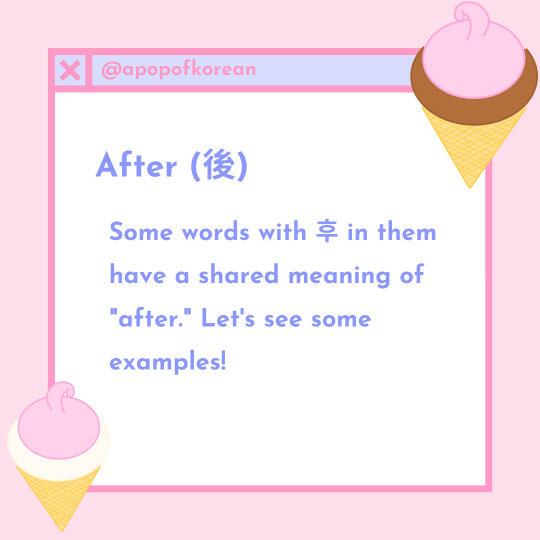


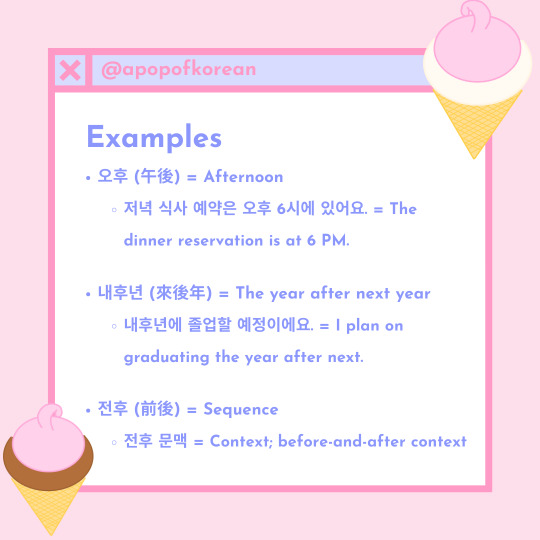

My masterlist
Join my Discord chat here to practice Korean with others!
Follow me on Instagram here for more Korean content!
Check out my Ko-Fi to support this blog and my studies! Thank you for your generosity!
#korean#korean language#langblr#korean langblr#study korean#studying korean#learn korean#learning korean#apok#korean vocab#korean vocabulary#hanja#hangul#한국어#한글#한자#한국어 배우기#한국어 공부하기#어휘#단어
100 notes
·
View notes